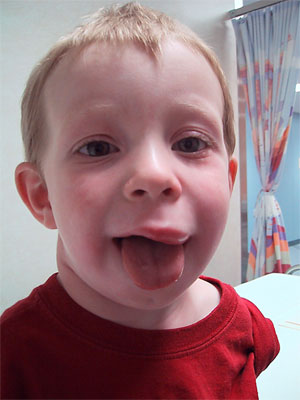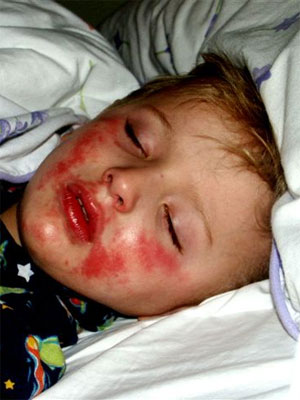Maria Said Food Allergy Week Interview

Australians with Food Allergies Don't Feel Safe Eating Out Be Aware and Show You Care
New research conducted by Allergy & Anaphylaxis Australia on its member database has found that 4 out of 5 respondents have had an allergic reaction when eating away from home. These findings have been released as part of a call to action in Food Allergy Week for Australians to learn more about the potentially life-threatening effects of food allergy, how to prevent exposure to allergens and how to manage an allergic reaction.
Maria Said, CEO of Allergy & Anaphylaxis Australia, states, "There are still too many incidents involving consumption of a known food allergen when eating out of the home. During Food Allergy Week we are asking all Australians – those who prepare and serve food (including family and friends), plus those with food allergies - to further educate themselves on how to better avoid allergic reactions, and how to manage them when they do occur."
The research, conducted by Allergy & Anaphylaxis Australia (A&AA), revealed:
Nearly 80 per cent of A&AA members have suffered a reaction/been served food that they are allergic to whilst eating away from home.
70 per cent of A&AA members don't feel confident eating away from home.
94 per cent of A&AA members don't think people have a good understanding of the seriousness of food allergy.
Food Allergy Week also sees the launch of Allergy Pal - a free smartphone app that helps parents better manage a child's allergies and allergic reactions by enabling fast access to their current ASCIA Action Plan. Allergy Pal helps reduce the stress of leaving your child with family and friends by giving them free, fast and easy access to the ASCIA Action Plan and the educational material needed to care for a child with food allergies. This includes on-the-spot access to life saving personalised information about a child's allergy triggers and safe foods as added by the parent/carer.
Allergy Pal has been developed by Australian paediatric allergists, professors Mimi Tang and Katie Allen at the Murdoch Children's Research Institute in conjunction with Allergy & Anaphylaxis Australia and the Australiasian Society of Clinical Immunology and Allergy (ASCIA).
Comedian and Food Allergy Week ambassador Adam Rozenbachs, who has a severe peanut allergy, has experienced several allergic reactions while eating out, one of which saw him hospitalised.
"I can usually manage my food allergy by being vigilant, particularly when eating out. However, I have had several reactions, the most dangerous was as a result of calamari finger that must have contained peanut, which ended with a stay in hospital. While there has been the occasional slip up, I do feel awareness is in the food service industry is quite high, especially in regard to handling serious nut allergies. This education is crucial and can be life-saving, which is why it's so important for all Australians to be allergy aware."
Ms Said stresses, "Each and every one of us has a vital role to play in reducing the incidence of reactions and knowing how to help manage a reaction appropriately. It doesn't take long to learn more about food allergy, but misunderstanding can be fatal."
Food Allergy Week is currently underway and runs until Saturday 19 May. For more information on how you can 'be aware, show you care" head to our website, www.foodallergyaware.com.au.
 Be Allergy Aware:
Be Allergy Aware:
How to reduce exposure to allergens:
Know what your friends and family are allergic to
Be very clear in disclosing your food allergy to caterers when you are out and about
Read food labels thoroughly, and if in doubt, leave it out
Learn more about food allergies & how to manage them:
Friends and family can learn more at: foodallergyeducation.org.au
Food industry members can undertake a free online training course via: foodallergyeducation.org.au
More detailed info can be found at allergyfacts.org.au
Download Allergy Pal:
The Allergy Pal app is available for free download now for both iOS and Android phones from Apple, Google Play or your favourite App Store.
Maria Said, CEO of Allergy & Anaphylaxis Australia, states, "There are still too many incidents involving consumption of a known food allergen when eating out of the home. During Food Allergy Week we are asking all Australians – those who prepare and serve food (including family and friends), plus those with food allergies - to further educate themselves on how to better avoid allergic reactions, and how to manage them when they do occur."
The research, conducted by Allergy & Anaphylaxis Australia (A&AA), revealed:
Nearly 80 per cent of A&AA members have suffered a reaction/been served food that they are allergic to whilst eating away from home.
70 per cent of A&AA members don't feel confident eating away from home.
94 per cent of A&AA members don't think people have a good understanding of the seriousness of food allergy.
Food Allergy Week also sees the launch of Allergy Pal - a free smartphone app that helps parents better manage a child's allergies and allergic reactions by enabling fast access to their current ASCIA Action Plan. Allergy Pal helps reduce the stress of leaving your child with family and friends by giving them free, fast and easy access to the ASCIA Action Plan and the educational material needed to care for a child with food allergies. This includes on-the-spot access to life saving personalised information about a child's allergy triggers and safe foods as added by the parent/carer.
Allergy Pal has been developed by Australian paediatric allergists, professors Mimi Tang and Katie Allen at the Murdoch Children's Research Institute in conjunction with Allergy & Anaphylaxis Australia and the Australiasian Society of Clinical Immunology and Allergy (ASCIA).
Comedian and Food Allergy Week ambassador Adam Rozenbachs, who has a severe peanut allergy, has experienced several allergic reactions while eating out, one of which saw him hospitalised.
"I can usually manage my food allergy by being vigilant, particularly when eating out. However, I have had several reactions, the most dangerous was as a result of calamari finger that must have contained peanut, which ended with a stay in hospital. While there has been the occasional slip up, I do feel awareness is in the food service industry is quite high, especially in regard to handling serious nut allergies. This education is crucial and can be life-saving, which is why it's so important for all Australians to be allergy aware."
Ms Said stresses, "Each and every one of us has a vital role to play in reducing the incidence of reactions and knowing how to help manage a reaction appropriately. It doesn't take long to learn more about food allergy, but misunderstanding can be fatal."
Food Allergy Week is currently underway and runs until Saturday 19 May. For more information on how you can 'be aware, show you care" head to our website, www.foodallergyaware.com.au.
 Be Allergy Aware:
Be Allergy Aware: How to reduce exposure to allergens:
Know what your friends and family are allergic to
Be very clear in disclosing your food allergy to caterers when you are out and about
Read food labels thoroughly, and if in doubt, leave it out
Learn more about food allergies & how to manage them:
Friends and family can learn more at: foodallergyeducation.org.au
Food industry members can undertake a free online training course via: foodallergyeducation.org.au
More detailed info can be found at allergyfacts.org.au
Download Allergy Pal:
The Allergy Pal app is available for free download now for both iOS and Android phones from Apple, Google Play or your favourite App Store.
Interview with Maria Said (CEO A&AA)
Question: How can we all increase our awareness for allergies in Australia?
Maria Said: The best thing you can do is familiarise yourself with the signs and symptoms of an allergic reaction, and know what to do if you recognise that someone is having an allergic reaction.
Question: What are the main signs and symptoms associated with an allergic reaction?
Maria Said: Signs and symptoms of food allergy can be mild, moderate or severe. An allergic reaction can include; hives, swelling of the lips, face and eyes, abdominal pain, vomiting, swelling of the tongue, swelling of the throat, breathing difficulty, persistent dizziness and/collapse. If left untreated, signs and symptoms related to breathing and heart/blood pressure can be fatal.
Check out our handy Signs and Symptoms animation here - this can help you distinguish between a mild or severe allergic reaction too.
Question: What should you do if someone is having a severe allergic reaction?
Maria Said: 1. Lay person flat on the ground (if breathing is difficult allow to sit on the ground)
2. Administer the adrenaline autoinjector (EpiPen®)
3. Call an ambulance on triple zero (000).
4. Call their emergency contact
5. After 5 minutes, if there is no response or their condition is worsening, administer a second adrenaline autoinjector (if available)
If in doubt, give adrenaline autoinjector.
Also remember that if someone with known food or insect allergy suddenly develops severe asthma-like symptoms, give adrenaline autoinjector FIRST, then asthma reliever.
Question: Why do you believe Australia has the highest rate of food allergies, in the world?
Maria Said: There are lots of theories, but no one answer to this question. There is a lot of research continuing into this area and we hope to have more pieces of the puzzle in coming years.
Question: What are the main allergies, in Australia?
Maria Said: 90% of allergic reactions are caused by ten foods - wheat, sesame, peanuts, tree nuts, soy, shellfish, fish, egg, lupin and cow's milk. You can be allergic to any food, but these are the most common allergens in Australia. Many children with food allergies are allergic to a number of foods rather than just one food.
Question: How can we support Australians with allergies to feel more comfortable, to eat outside their homes?
Maria Said: Food service providers need to train their staff, from chefs through to wait staff, about how to cater to food allergies. We have a basic checklist for food service staff here. This will help prevent mix ups with food labelling and cross contamination, and help those with allergies feel more relaxed when eating out, as it can be very anxiety inducing to put food preparation in someone else's hands. There is also free e-training for food service staff in allergen management https://foodallergytraining.org.au/
We also have some great resources on our website that can help you cook allergy-friendly food for friends and family with food allergies. Check out this tip sheet for entertaining with allergies.
 Question: What tips do you have for Australians who have allergies when eating out?
Question: What tips do you have for Australians who have allergies when eating out?
Maria Said: Those with food allergies are responsible for informing the chef and wait staff about their allergies. We have handy chef cards available on our website that can be printed out, filled in and handed to food service staff so your food allergies are clearly communicated to the chef. We also have some great information on our A&AA website about eating out https://allergyfacts.org.au/allergy-management/risk/out-and-about
Question: Where can we learn to administer an EpiPen®?
Maria Said: We have an educational animation here that shows you how to use an EpiPen® - learning how to do this could save someone's life.
Question: What message do you hope to spread this Food Allergy Week?
Maria Said: This Food Allergy Week we hope to raise awareness of food allergy in Australia, to help reduce the risk of a reaction for those living with food allergy and to help manage potentially life-threatening emergencies when they happen. The general community need to be aware of just how serious food allergies can be.
Interview by Brooke Hunter
Maria Said: The best thing you can do is familiarise yourself with the signs and symptoms of an allergic reaction, and know what to do if you recognise that someone is having an allergic reaction.
Question: What are the main signs and symptoms associated with an allergic reaction?
Maria Said: Signs and symptoms of food allergy can be mild, moderate or severe. An allergic reaction can include; hives, swelling of the lips, face and eyes, abdominal pain, vomiting, swelling of the tongue, swelling of the throat, breathing difficulty, persistent dizziness and/collapse. If left untreated, signs and symptoms related to breathing and heart/blood pressure can be fatal.
Check out our handy Signs and Symptoms animation here - this can help you distinguish between a mild or severe allergic reaction too.
Question: What should you do if someone is having a severe allergic reaction?
Maria Said: 1. Lay person flat on the ground (if breathing is difficult allow to sit on the ground)
2. Administer the adrenaline autoinjector (EpiPen®)
3. Call an ambulance on triple zero (000).
4. Call their emergency contact
5. After 5 minutes, if there is no response or their condition is worsening, administer a second adrenaline autoinjector (if available)
If in doubt, give adrenaline autoinjector.
Also remember that if someone with known food or insect allergy suddenly develops severe asthma-like symptoms, give adrenaline autoinjector FIRST, then asthma reliever.
Question: Why do you believe Australia has the highest rate of food allergies, in the world?
Maria Said: There are lots of theories, but no one answer to this question. There is a lot of research continuing into this area and we hope to have more pieces of the puzzle in coming years.
Question: What are the main allergies, in Australia?
Maria Said: 90% of allergic reactions are caused by ten foods - wheat, sesame, peanuts, tree nuts, soy, shellfish, fish, egg, lupin and cow's milk. You can be allergic to any food, but these are the most common allergens in Australia. Many children with food allergies are allergic to a number of foods rather than just one food.
Question: How can we support Australians with allergies to feel more comfortable, to eat outside their homes?
Maria Said: Food service providers need to train their staff, from chefs through to wait staff, about how to cater to food allergies. We have a basic checklist for food service staff here. This will help prevent mix ups with food labelling and cross contamination, and help those with allergies feel more relaxed when eating out, as it can be very anxiety inducing to put food preparation in someone else's hands. There is also free e-training for food service staff in allergen management https://foodallergytraining.org.au/
We also have some great resources on our website that can help you cook allergy-friendly food for friends and family with food allergies. Check out this tip sheet for entertaining with allergies.
 Question: What tips do you have for Australians who have allergies when eating out?
Question: What tips do you have for Australians who have allergies when eating out? Maria Said: Those with food allergies are responsible for informing the chef and wait staff about their allergies. We have handy chef cards available on our website that can be printed out, filled in and handed to food service staff so your food allergies are clearly communicated to the chef. We also have some great information on our A&AA website about eating out https://allergyfacts.org.au/allergy-management/risk/out-and-about
Question: Where can we learn to administer an EpiPen®?
Maria Said: We have an educational animation here that shows you how to use an EpiPen® - learning how to do this could save someone's life.
Question: What message do you hope to spread this Food Allergy Week?
Maria Said: This Food Allergy Week we hope to raise awareness of food allergy in Australia, to help reduce the risk of a reaction for those living with food allergy and to help manage potentially life-threatening emergencies when they happen. The general community need to be aware of just how serious food allergies can be.
Interview by Brooke Hunter
MORE





